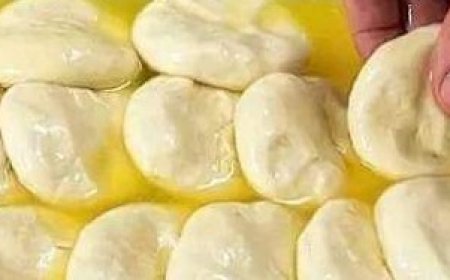Homemade Fresh Cheese Recipe

This Homemade Fresh Cheese is a simple and satisfying way to enjoy fresh, soft cheese made right in your kitchen. With just a few ingredients, you’ll create a versatile and delicious cheese that pairs wonderfully with bread, fresh greens, and your favorite vegetables. Perfect for breakfast, snacks, or light meals, this cheese is a delightful addition to your table.
Preparation Time
Prep Time: 20 minutes
Cook Time: 15 minutes
Draining Time: 8-12 hours (overnight)
Total Time: About 12 hours 35 minutes
Ingredients
Pepper: 1, sliced
Bread: Your favorite type (e.g., baguette, pita, or whole grain)
Fresh Greens: Lettuce, spinach, arugula, or your choice
Directions
Step 1: Prepare the Setup
Place a large casserole on the stove and set a glass jar inside to create a water bath.
Fill the casserole with water around the jar, ensuring the water doesn’t overflow into the jar.
Heat the water over medium heat.
Step 2: Heat the Milk
Pour 2 liters of milk into the glass jar.
Add 1 tablespoon of salt and stir.
Heat the milk gently until it reaches about 45°C (113°F).
Step 3: Prepare the Egg Mixture
In a separate bowl, whisk the 4 eggs and 200 grams of yogurt until smooth.
Step 4: Curdle the Milk
Slowly pour the egg mixture into the warm milk while stirring continuously.
Cook over medium heat for 15 minutes, stirring occasionally. The curds will form, signaling the cheese is ready.
Step 5: Strain the Cheese
Pour the curdled mixture into a cheesecloth or sieve placed over a bowl. Let it drain for 10 minutes.
Transfer the curds to a container lined with cheesecloth, fold the cloth over the curds, and weigh it down with a plate to remove excess moisture.
Step 6: Refrigerate Overnight
Refrigerate the cheese with the weight applied overnight to allow it to firm up.
Step 7: Prepare the Cheese
After draining, the cheese should be firm and sliceable.
For added flavor, season with herbs or drizzle with olive oil before serving.
Step 8: Serve
Slice the cheese and serve with your favorite bread, sliced pepper, and fresh greens. Enjoy this fresh, homemade delight!
Serving Suggestions
Pair with a variety of breads, from crusty baguettes to soft pita.
Serve as part of a breakfast or brunch spread with jams, honey, or olives.
Add to a charcuterie board with nuts, dried fruits, and crackers.
Use as a filling for sandwiches or wraps with fresh vegetables and spreads.
Cooking Tips
Use whole milk for a richer, creamier cheese.
Ensure the milk doesn’t boil; gentle heating is key for proper curd formation.
Experiment with flavors by adding fresh herbs like dill, parsley, or chives to the cheese.
A thermometer helps achieve the ideal milk temperature, but you can also test with your finger; it should feel warm but not hot.
Nutritional Benefits
Milk: A good source of calcium and protein for bone health.
Eggs: Add richness and provide essential nutrients like vitamin D and choline.
Yogurt: Contains probiotics, promoting gut health.
Dietary Information
Gluten-free.
Vegetarian-friendly.
High in protein and calcium.
Nutritional Facts (per serving, approximate)
Calories: 120
Protein: 8g
Fat: 8g
Carbohydrates: 4g
Calcium: 200mg
Storage
Store the cheese in an airtight container in the refrigerator for up to 5 days.
If seasoned with olive oil or herbs, ensure it’s well-covered to maintain freshness.
Why You’ll Love This Recipe
Simple and rewarding to make with just a few basic ingredients.
Fresh, customizable flavors to suit your taste preferences.
Versatile for breakfast, snacks, or as part of a meal.
A wholesome, homemade alternative to store-bought cheese.
Conclusion
This Homemade Fresh Cheese is a versatile and flavorful addition to your culinary repertoire. Whether enjoyed on its own or paired with breads and vegetables, it’s a healthy, satisfying option that’s sure to please. Try this easy recipe today and elevate your meals with the fresh taste of homemade cheese!
Frequently Asked Questions
Can I use raw milk instead of store-bought milk?
Yes, raw milk works well, but ensure it’s pasteurized for safety before use.
Can I skip the yogurt?
Yogurt adds tanginess, but you can substitute with buttermilk or sour cream.
How do I know the curds are ready?
The curds will form and separate from the whey (a clear liquid) when cooked properly.
What herbs pair well with this cheese?
Dill, parsley, chives, or thyme work beautifully for added flavor.
Can I make this cheese without eggs?
Eggs help with firmness, but you can skip them for a softer, creamier cheese.
What if I don’t have cheesecloth?
Use a clean, thin kitchen towel or a fine mesh strainer as an alternative.
How do I prevent the cheese from being too salty?
Adjust the salt to your taste or rinse the curds briefly if they’re too salty.
Can I freeze this cheese?
Freezing is not recommended, as it may alter the texture and flavor.
How can I make the cheese firmer?
Apply more weight during the draining process for a firmer texture.
Can I use plant-based milk?
The recipe is best with animal milk, as plant-based milks typically don’t curdle in the same way.
What's Your Reaction?





















